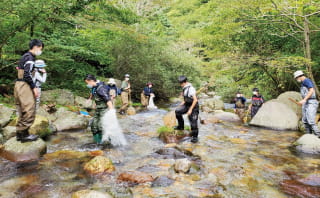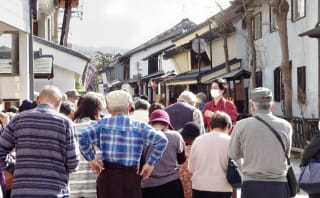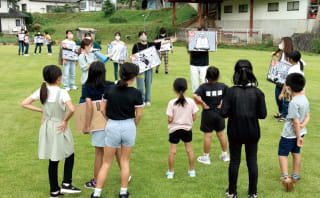- Field of Environment
- Field of Tourism
- Field of Regional Development
Creating Sustainable and Attractive Communities
Rich natural environments are significant tourism resources in themselves. Promoting tourism that leverages these wonderful resources can invigorate local communities, demonstrating the close connection between the environment, tourism, and regional revitalization. By learning from various perspectives within the local community, let's aim to create sustainable and appealing communities.
-
Experiential Learning through the Community
Experiencing the local nature, people, and work transforms what you 'know' into what you 'can do.' We value hands-on learning closely connected to the community to ensure that what you learn can be effectively applied in the future.
-
Interdisciplinary Learning Across Three Closely Related Fields
The natural environment is a major tourism resource, and tourism is a key pillar of regional policy and industry. You can choose an area of interest from the three fields of 'Environment,' 'Tourism,' and 'Regional Development,' and deepen your knowledge by studying related fields in an interdisciplinary manner.
-
From Learning to a Career in Supporting People's Lives
Graduates of the Faculty of Environmental Tourism are active in various fields. Through four years of study, you will develop the ability to identify and solve local community issues, leading to a career in supporting people's lives.
Field of Environment

Learning How to Protect and Utilize Nature's Bounty
for Human Life
To sustainably develop local communities that benefit from natural environments, you will acquire the necessary knowledge and perspectives. By deepening your understanding of the natural environment, you will learn through various fieldwork experiences.
Key Learning Points
Understanding the Natural Environment
Each region’s unique climate and landscape have shaped its natural environment. You will study the origins and mechanisms of these environments to sustainably harness the benefits they offer.
Learning Through Fieldwork
In addition to theoretical learning, you will deepen your understanding of nature through various fieldwork activities, such as studying plants in the mountains or catching creatures in rivers.
Aiming for a Sustainable Natural Environment
We will explore how to create a sustainable society where people and nature can coexist, ensuring that we preserve and pass on nature's resources to future generations.
Research Areas and Seminar Themes
| Kazuaki Takahashi | Uncovering the Ecology of Flora and Fauna in Satoyama Landscapes and Applying Ecosystem Services to the Local Community |
|---|---|
| Mitsuo Yoshito | Developing Optimal Conservation Management Strategies for Freshwater Ecosystems |
Field of Tourism

Addressing Regional Challenges and
Promoting Revitalization Through Tourism
Efforts to promote regional development through tourism are actively taking place across the country. By re-examining a region’s nature, culture, and other unique aspects from various perspectives, we explore how tourism can contribute to sustainable regional development.
Key Learning Points
Re-evaluating Regional Characteristics and Attractions
By looking at the natural, cultural, and historical resources unique to a region from new perspectives, we develop methods for creating more attractive communities.
Delving into Regional Issues
Through fieldwork and on-site investigations, we gain an understanding of the current state of a region and explore the challenges it faces.
Proposing and Implementing Attractive Tourism Plans
We develop and execute tourism plans that foster communication between the region and tourists, with the goal of revitalizing the community.
Research Areas and Seminar Themes
| Kesuke Kumagai | Tourism, Transportation, and Scenic Urban Development / Area Renovation and Landscape Design |
|---|---|
| Shigeo Matsushita | Regional Management Through Collaboration Among Diverse Stakeholders |
| Hiroshi Kodaira | Regional Branding and City Promotion |
| Takato Yokoseki | A Landscape Architecture Approach to Evaluating and Managing Regional Resources for Tourism Development |
| Tsukasa Hata | Geographical Research with 'Agriculture' as a Key Theme |
Field of Regional Development

Uncovering and Leveraging the Diverse Attractions
of the Region for Community Building
We tackle various challenges facing the region through projects aimed at further revitalizing local industries and the policies and businesses that support them. Our goal is to connect these efforts to broader regional development.
Key Learning Points
Discovering the Region’s Unique Attractions
Drawing on sociology, policy studies, and other disciplines, you will learn approaches and processes for community building that capitalize on the region's richness and beauty.
Practical Learning for Problem-Solving
Beyond specialized knowledge in regional development, we engage in project-based learning to address and solve the challenges faced by the community.
Ueda and Surrounding Areas as a Learning Field
While studying in a local context, you will develop a global perspective, researching ways to create vibrant communities and effectively utilize regional resources.
Research Areas and Seminar Themes
| Kyosuke Kuboki | Municipal Policies for Advancing Sustainable Community Development |
|---|---|
| Mutsumi Furuta | Revitalizing Communities Through the Utilization of Regional Resources |
| Yoichi Aikawa |
|
